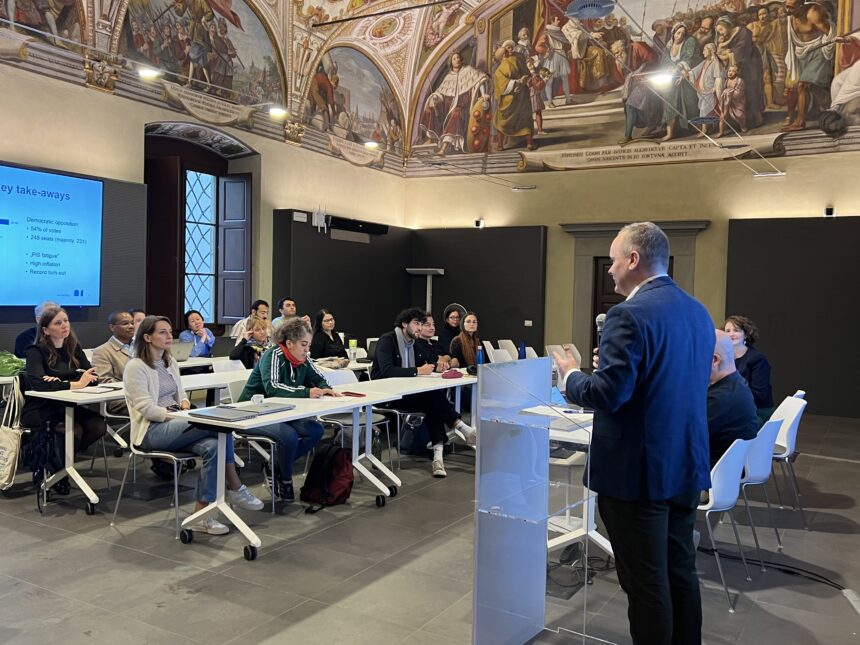The application deadline for the 2024-2025 call is 25 January 2024 (14:00 CET).
The Policy Leader Fellowship (PLF) at the Florence School of Transnational Governance (STG) is a residential programme for mid-career policy professionals from a range of policy fields: politics, civil service, media, non-governmental organisations and others. This unique programme is nested within one of the most renowned academic institutions in Europe and provides the fellows with an insider view into the EU policy making processes. However, the programme does not require academic training background and instead seeks to attract individuals with diverse hands-on experiences in policymaking across the world. Besides having direct access to the STG and the EUI faculty and researcher community, the fellows learn from each other and form lasting professional and personal connections.
The fellows spend five or ten months at the STG developing policy recommendations and practical solutions for pressing issues of transnational relevance, inspired and informed by their work experience. In addition, the fellows attend professional skills trainings and can freely participate in the academic life and activities of the EUI to enhance their fellowship project. At the same time, the fellows enrich the STG community by bringing their first-hand experiences to teaching, training, and networking at the School.
Upon the completion of the programme, the fellows join a global alumni network of policy professionals and have access to lifelong training opportunities at the EUI.
We welcome applications from anywhere in the world, regardless of nationality. EU citizenship is not required. While there is no age limit, the applicants are expected to demonstrate at least 10 years of relevant professional experience. For further selection criteria, please see the selection procedure section.
FUNDING
Duration
The fellowships are offered for a duration of five or ten months. Candidates should indicate their preference from the following options:
- Five months: September 2024 – January 2025 or February 2025 – June 2025
- Ten months: September 2024–June 2025
Residence
Fellows must reside in the area of Florence for the duration of their Fellowship so that they can take an active part in the activities of the EUI/STG and the fellowship programme (with the possibility of short visits outside Florence and Italy). The fellowship cannot be carried out remotely/online.
Grant
The basic grant is €2,500 per month.
Successful applicants who receive other grants or salaries must disclose this to the EUI. The amount of the Fellowship will be fixed at a lower rate (minimum €1,750 per month) depending on the amount of the additional income (upon production of relevant supporting documents).
Family Allowances
A household allowance of up to € 300 per month is paid to a Fellow with a partner if the partner lives with them in Florence and on the condition that the partner’s income is less than € 2,000 per month. The sum of income and allowance cannot exceed € 2,000 per month (i.e. if the income is more than € 1,700, the allowance will be paid only to top up to € 2,000).
An allowance of € 200 per month is paid for each dependent child. Fellows are entitled to these allowances if they can declare that they are not receiving any similar allowance from another source, and upon submission of relevant supporting documents (i.e. marriage or partner certificate, proof of cohabitation in Florence; birth certificates).
For dependent children in full-time education and over the age of 18, a school or university certificate is required. No allowance is paid for dependent children over the age of 26.
Taxation
The fellowship is not taxed by the EUI. Fellows are, however, required to comply with any other tax provisions which may be applicable to them.
Medical Insurance
Fellows must have adequate medical insurance coverage during their stay at the Institute. They can either provide proof of their own insurance scheme, or subscribe to the EUI’s private sickness and health insurance scheme at their own expense. See the Cigna Insurance Scheme for conditions.
Travel Expenses
Fellows (but not their families) receive reimbursement for the incoming trip from their place of origin to Florence, and for the outgoing trip to their destination at the end of their fellowship.
- First-class rail (travel by car is also reimbursed on this basis)
- Economy-class air fare
The maximum amount for travel reimbursement amounts to €1,200, including both incoming and outgoing trip. Taxi expenses are not reimbursed.
Removal/ Re-installment expenses
There is no provision for removal or installation expenses.
REQUIRED DOCUMENTS
- CV (maximum 3 pages);
- Short biography (maximum 250 words); the bio serves as a quick overview of the candidate’s profile for the selection process and will also be used for communications purposes if the applicant is accepted for the fellowship.
- Two reference letters
- Copy of highest educational certificate;
- Letter of motivation (maximum 1000 words) outlining the applicant’s main reasons to apply for the fellowship, the objectives to be pursued during the programme, highlighting interest in specific transnational policy issues and future professional aspirations;
- Work plan (maximum 2500 words) should include the project title, a short summary/abstract, the main objectives, milestones and related activities to achieve the envisaged outputs; the activities should be allocated appropriately based on five or ten-month’ fellowship timeline;
The expected level of English proficiency is level C1 of the Common European Framework of Reference (CEFR).
SELECTION CRITERIA
The general profile of the candidates:
- Mid-career professionals able to demonstrate solid professional experience (minimum 10 years) and potential for future excellence in a given policy area; candidates with strictly academic profile typically will not be considered.
- Self-motivated and driven, able to autonomously accomplish the activities presented under the fellowship work plan.
- Open-minded and curious individuals willing to engage in peer discussions on topics which may go beyond their area of expertise.




